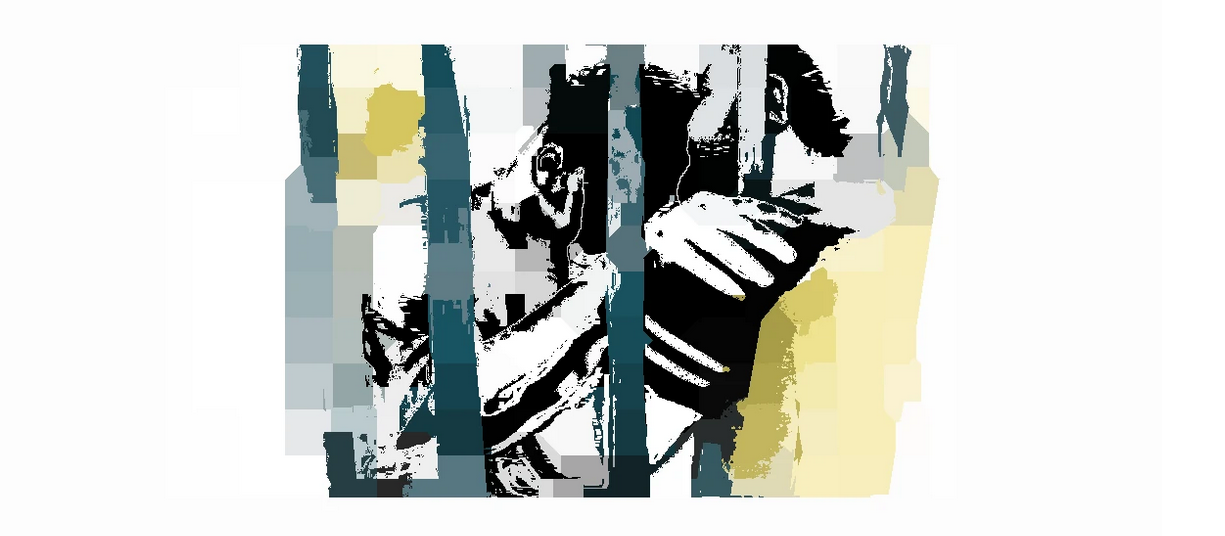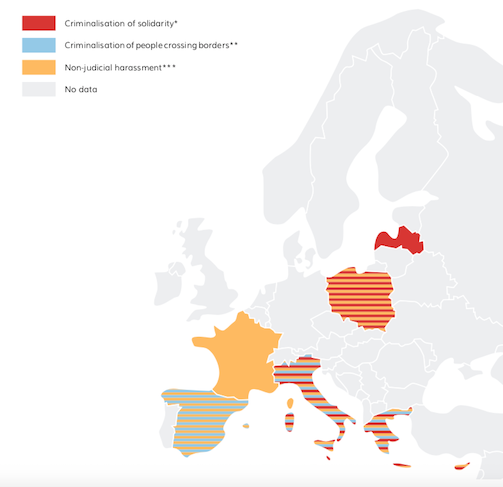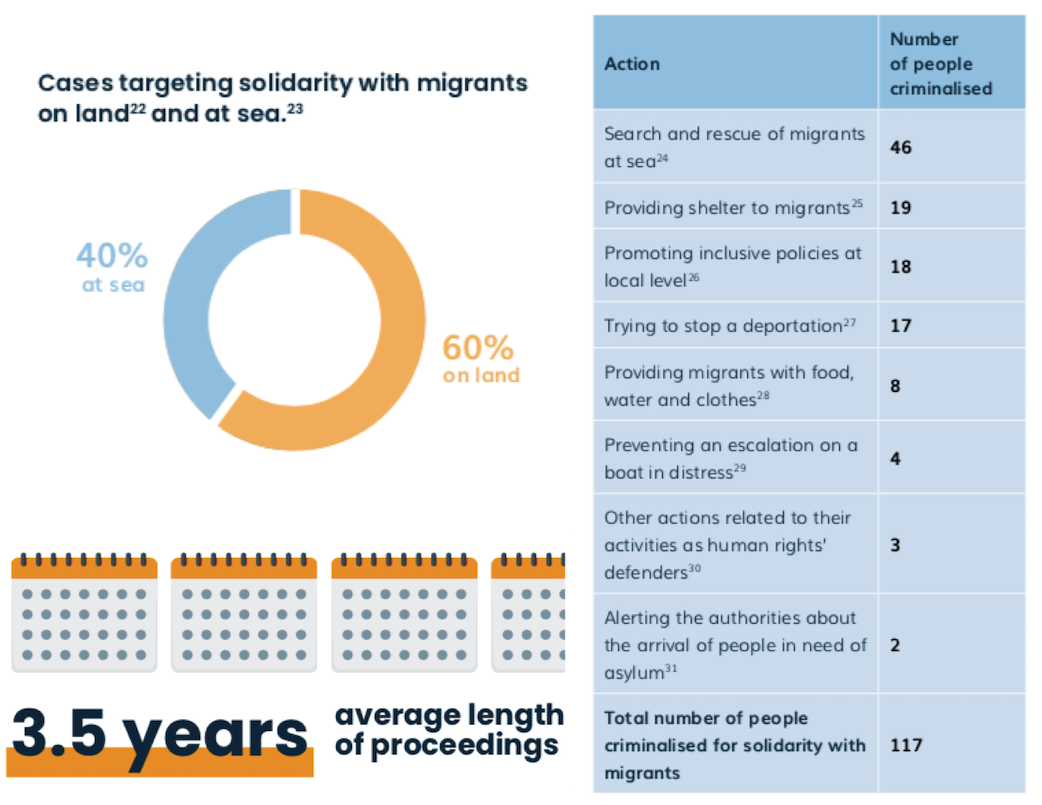Consequences of the facilitation laws
The history of migration is a history of restrictions on the movement of all but a white wealthy elite. To those with the right passport, the earth appears as a smooth surface whose boundaries few can cross effortlessly. For people with the “wrong” passport, each border carries the threat of violence, exploitation or death.
O.B.'s story is, sadly, one among thousands. As the legislation does not explicitly describe which conduct is to be considered unlawful, any activity deemed to allow the entry, transit or exit of persons without the required authorisation may be considered ‘facilitation of migration’ and therefore criminalized. Under the pretext of ‘fighting people smuggling networks’, the EU and its member states end up criminalising people on the move themselves, who are accused of driving a boat or car during unauthorized border crossings, as well as activists and organizations, on the basis of providing food, shelter, medical assistance, transportation or giving first aid to people at the border areas.
Index

The lack of information and data from state authorities on the effects of facilitation laws is a major obstacle to obtain a complete picture of the phenomenon. The available data on the topic is largely collected by volunteers, political activists from the "no border movement" and their networks. The following is a brief compilation of the data and information collected in their various reports. This summary is not an exhaustive compilation, but aims to provide an overview of the magnitude of the consequences of facilitation laws, as well as to ease the search for some of the cases and published reports. Special thanks go to all the defendants and people convicted who shared their stories and whose experiences form the basis and core of this website. To this must be added the tireless work of the many lawyers, researchers and investigative journalists who have contributed with their expertise, time and dedication. Without all these people and networks, this website would not have been possible. In addition, due to the large number of criminalised persons, this website can only capture a fraction of the overall complexity of the issue.
According to the European Multidisciplinary Platform Against Criminal Threats (EMPACT), between 2018 and 2021 alone, almost 10,000 people were arrested as alleged "people smugglers" in the EU. The cases listed below are not intended to be an exhaustive list of those affected by facilitation laws, but are only a few examples of this reality.

Crossing a border – or helping someone to do so – should not in itself be a crime. The criminalization of people who cross borders simply shifts attention away from the racist violence which Europe enacts through the border itself. The problem, in fact, does not lie with those who are crossing borders, but with a border regime that forces hundreds of people every day to embark on dangerous and often lethal journeys. The abolition of this regime, rather than the criminalization of those who are challenging it, represents the only adequate response to our current situation.
Criminalisation of people on the move
Recent studies reveal that most of the people accused of steering the boat or the car, and arrested for ‘facilitating unauthorised migration’, are people on the move themselves. The charges do not take into account the actual involvement or intent of the accused. Beyond the fact that in many cases it cannot even be proven that the accused person actually drove the boat or car, the reasons why a person may end up doing so may arise from different contexts. People are forced to drive a boat, e.g. under threat of violence, being left alone by those who they paid, while others are forced to take additional risks because they cannot afford the trip for themselves or their family.
The criminalisation of ‘boat drivers’ is characterised by serious rights violations and procedural shortcomings. Individuals are typically arrested immediately upon arrival, held in pre-trial detention for months, and have very limited options to defend themselves and access support. Many people on the move are found guilty even when the evidence used against them in court is extremely weak. Convictions are often based on the testimony of a single witness, usually a coast guard officer. In addition, there is no thorough presentation and evaluation of evidence in the court proceedings. Other shortcomings include superficial investigations, lack of due process and adequate legal representation or proper interpreters.
In the context of its work to understand and communicate who is affected by the criminalisation of facilitation, borderline-europe proposed the "smuggler portraits" to show who and what stories are really behind the common image of the "evil faceless criminal". As they explain, "what is really behind the 'fight against smugglers' is clarified, among other things, by looking at WHO is being criminalised".
Further information from different regions will show you specific figures, reports, exemplary cases and the organisations working on the ground:
Criminalisation of solidarity
Individuals, groups and organisations working to ensure that people have access to fundamental rights regardless of their status are inevitably caught in the crosshairs of this policy of isolation and deterrence. As a result, life-sustaining measures at sea become an aid to illegal entry, the provision of food and accommodation an aid to illegal residence. All provision of moral and material aid is suspicious and/or punishable. Various means of policing and prosecution are being deployed, honed and expanded throughout Europe. In recent years we are experiencing a wave of repression against all those who organise against the violence walling-off the Fortress EUrope by standing in solidarity with people on the move.
Rescue ships are still being prevented from leaving, social centres are being demolished, solidarity activists are being detained or have already been sentenced to imprisonment or, like the iuventa-crew, are trapped in long-standing and expensive court cases. Firefighters, priests, lawyers, students, activists – old and young – women and men – are among the hundreds of Europeans who have been subjected to state repression in recent years for their solidarity with people on the move. Whether they unite with friends, neighbours and colleagues – in hiding, in small initiatives or large organisations – in everyday life, on the streets, at work or in social centres, the criminalisation of solidarity is a real daily threat.
Even if they end in an acquittal, trials still have heavy consequences on human rights defenders’ finances, personal life, and psychological wellbeing.
The independent global media platform “Open Democracy” has compiled the longest known list of more than 250 people that have been arrested, charged, or investigated for supporting people on the move between 2013 and 2019.
Search and rescue has been one of the areas where criminalisation has been systematic. Data collected by the EU Agency for Fundamental Rights (FRA) shows that between 2018 and 2020, 17 NGO vessels were involved in legal proceedings and more than 40 criminal cases were brought against crew members or vessels, including their seizure, by European states.

According to PICUM, between in 2023 alone, at least 117 people people were criminalised for actions with a clear solidary purpose, such as trying to rescue people in distress, or providing them with shelter and livelihood. Charges of "facilitation of unauthorised entry" were used to criminalise the 60% of the cases listed by PICUM.
Of these 117 cases, 83% (97) were in proceedings which had continued from previous years, and 17% (20) faced legal or administrative proceedings for the first time in 2023. Charges of "facilitation of unauthorised entry" were used to criminalise 60% of the cases listed by PICUM.
Judicial proceedings ended for 42 of the 117 people criminalised. Of these, 40 were acquitted. Many human rights defenders are acquitted but face long and distressing proceedings: The average length of the proceedings recorded by our media monitoring is 3.5 years.

PICUM’s data revealing at least additional fifteen cases of administrative sanctions and non-judicial harassment, concerning seventeen individuals and twelve NGOs. This confirms a concerning, ongoing trend observed in previous years as well as an increase compared to the figures from 2021 and 2022.
Let us be clear: the criminalization of solidarity is not the outcome solely of a violent border regime intent on keeping migrants out at all costs. It is part of a European apparatus of policing and social control that criminalizes poverty, induces precarity and isolation, and represses resistance. It has as much to do with austerity, and the precaritization and dispossession of large swathes of the European population as it has to do with migration. Even as it might take migrants as its first and most vulnerable targets, our governments’ anxiety for repression and social control responds to their own citizens’ realization that the things that migrants desire and are denied – safety, security, rights – are increasingly foreclosed to us as well.
The systematic criminalisation of activists and organisations working at the borders on the basis of life-supporting activities is intended to deter action at the border, and to create a climate of fear that limits actions in support of people on the move. Policing solidarity based on suspicion, intimidation, and the disciplining of civil society, aims to limit public support of people on the move, ultimately leading to an even more hostile and deadly environment for them.
In addition, it makes it possible to eliminate these actors from certain areas at the borders where governmental actors apply actions that violate the fundamental rights of people on the move, eliminating therefore potential witnesses. For example, the criminalisation of activists on the island of Lesvos has been used to cover up state pushback violence against migrants.
PICUM report shows how Italy and Greece had the highest number of people criminalised for solidarity (74 and 31 respectively), followed by Poland, Malta, Latvia, and Cyprus. Due to the large gap in statistical and official public data on persons charged with or convicted of smuggling and related offences, this selection can only show a few case examples from different regions:
Italy
- iuventa-crew: "Breaking: Court Drops Charges Against All Defendants in IUVENTA Trial" by iuventa-crew (19.04.2024).
- Mimmo Lucano: "Riace ex mayor Lucano gets suspended sentence on appeal" by Ansa (11.10.2023).
- Break Down The Borders: "Judge acquits 18 Turin activists who 'helped migrants'" by Infomigrants (13.03.2023) and "18 pro-migrant anarchists indicted for French border squats" by ANSA (23.03.2021).
- Mosè Zerai: "Cinque anni di indagini e menzogne: cadono tutte le accuse per don Zerai/Five years of investigations and lies: all charges against don Zerai dropped" by Avvenire (27.05.2022).
- Andrea Costa (Baobab): "Baobab chief risked 18 years for helping migrants, acquitted" by Infomigrants (05.05.2022) and "Baobab, la denuncia di Andrea Costa: "Sono accusato di immigrazione clandestina, ma ho solo aiutato nove ragazzi"/Baobab, Andrea Costa's denunciation: ‘I am accused of illegal immigration, but I only helped nine boys’" in La Repubblica (21.04.2022).
- Lorena Fornasir and Gian Andrea Franchi (Linea D'Ombra) "Investigation against migrant rights defenders Lorena Fornasir and Gian Andrea Franchi closed" by Front Line Defenders (23.11.2021).
Greece
- Sean Binder and Nassos Karakitsos (Free Humanitarians) "Greek court drops spying charges against refugee rescue activists. Case dismissed as being ‘overly vague’, but the 24 defendants still face separate felony investigation" by The Guardian (13.01.2023).
- Panayote Dimitras, Tommy Olsen, Madi Williamson and Ruhi Akhtar: "Greece: criminal investigations opened against human rights defenders Panayote Dimitras, Tommy Olsen, Madi Williamson and Ruhi Akhtar (joint communication)" by UN Special Rapporteur on Human Rights Defenders (09.05.2023).
- Lesvos 35: "Greek court drops espionage charges against aid workers" by The Guardian (01.05.2024).
- Ingeborg Beugel: "Dutch Journalist Awaits Trial in Greece for Helping Asylum Seeker" by Balkan Insight (01.06.2022).
- Kardamila (Chios): "Αναβλήθηκε η δίκη του 23χρονου που πρόσφερε νερό και φαγητό σε πρόσφυγες/The trial of the 23-year-old who offered water and food to refugees was postponed" by efsyn.gr (06.06.2022).
- Kilkis: "Θεσσαλονίκη: Καθοδηγούσαν αλλοδαπούς χωρίς χαρτιά να μπουν σε τρένο για Κιλκίς/Thessaloniki: They guided foreigners without papers to get on a train to Kilkis" by Typostes (01.10.2022).
Poland (cases named according to the locality where activists have been tried)
- Białystok: "Aktywiści pomagali imigrantom przy granicy. Sąd ich uniewinnił/Activists helped immigrants at the border. The court acquitted them" by Do Rzeczy (07.11.2023).
- Siedlce: "The case of an activist suspected of leading a criminal ring: a judge seconded by the Minister of Justice/Prosecutor General to hear the appeal against the pre-trial detention of the activist" by Helsinky Foundation For Human Rights (21.09.2023).
- Podlasie: "Sąd przyznał zadośćuczynienie zatrzymanej na Podlasiu wolontariuszce PIK-u!/Court awards compensation to PIK volunteer detained in Podlasie!" by Kik Warszawa (27.11.2023).
- "Polish activists found with Iraqis in car charged with aiding illegal crossings over Belarus border" by Notes from Poland (01.11.2021).
- Hajnówka: "Sąd nie zgodził się na areszt dla aktywistów, którzy ratowali życie rodzinie z dziećmi/The court did not agree to arrest activists who saved the lives of a family with children" by OKO.press (25.05.2022).